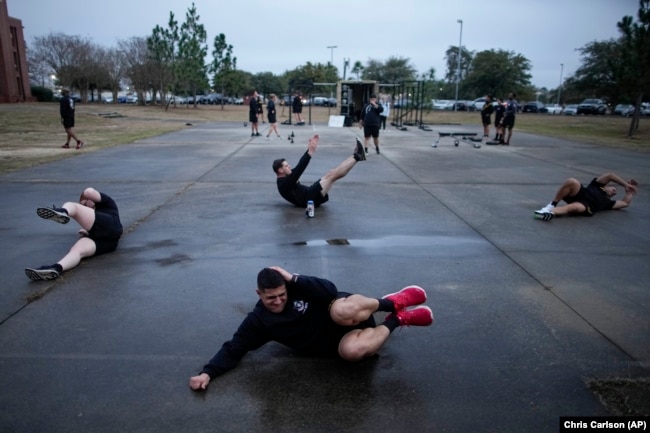Obesity Increased in US Military during Pandemic

Early COVID-19 pandemic lockdowns, long hours on his computer, and increased stress led U.S. Army Staff Sergeant Daniel Murillo to eat more. Then, places to work out were closed; organized exercise was out; and Murillo’s desire to work out on his own was low.
“The uniform was tighter,” said Murillo after gaining over 13 kilograms during the pandemic. “I could notice it,” he added.
Murillo was not the only U.S. soldier to deal with extra weight. New research says that the extra weight problem greatly increased in the U.S. military during the pandemic.
In the Army alone, almost 10,000 soldiers became heavily overweight, or obese, between February 2019 and June 2021. That is nearly 25 percent of the soldiers in the study. The Navy and the Marines also showed weight gains.
“The Army and the other services need to focus on how to bring the forces back to fitness,” said Tracey Perez Koehlmoos who led the research. She is the director of the Center for Health Services Research at the Uniformed Services University in Bethesda, Maryland.
“National security problem”
Overweight and obese troops are more likely to be injured and less likely to continue their physical work long term. Government research shows that the military loses more than 650,000 workdays yearly because of extra weight. And obesity-related health costs are more than $1.5 billion each year for current and former soldiers and their families.
Military leaders have been warning about the impact of obesity on the U.S. military for more than ten years. The pandemic effects show the need for urgent action, said retired Marine Corps Brigadier General Stephen Cheney, who co-wrote a recent report on the problem.
“The numbers have not gotten better,” Cheney said in a November online conference held by the American Security Project, a nonprofit organization. “They are just getting worse and worse and worse.”
Last year, the U.S. Army did not meet its goal of signing up new soldiers for the first time. Being overweight disqualifies more than 10 percent of people ages 17 to 24 who could enter the military.
Cheney said, “It is devastating.” And he called it a “national security problem.”
Extra weight can make it difficult for soldiers to meet the military fitness requirements. In the Army, if soldiers cannot pass the Army Combat Fitness Test, it could end their military careers.

Army Staff Sgt. Daniel Murillo, right, runs uphill as part of his training at Ft. Bragg on Jan. 18, 2023, in Fayetteville, North Carolina. (AP Photo/Chris Carlson)
The research
The researchers looked at nearly 200,000 soldiers from two periods: before the pandemic, from February 2019 to January 2020, and during the crisis, from September 2020 to June 2021.
They found that nearly 27 percent who were healthy before the pandemic became overweight. And nearly 16 percent of those who were previously overweight became obese. About 18 percent of the soldiers were obese before the pandemic. By 2021, it grew to 23 percent.
The researchers used a calculation of weight and height called BMI, or body mass index.
A person with a BMI of 18.5 to 25 is considered healthy, while a BMI of 25 to less than 30 is considered overweight. A BMI of 30 or higher is considered obese. Some experts say the BMI measure is flawed. They say it does not consider muscle mass or other health conditions in its calculations. However, BMI remains a widely used tool.
In Sergeant Murillo’s case, his BMI during the pandemic reached nearly 32. He knew he needed help, so he started a strict exercise program through the Army’s Holistic Health and Fitness, or H2F, program.

Army Staff Sgt. Daniel Murillo in physical training at Ft. Bragg on Wednesday, Jan. 18, 2023, in Fayetteville, North Carolina. (AP Photo/Chris Carlson)
“We do two runs a week, 6 and-a-half to 8 kilometers,” Murillo said. “Some mornings I wanted to quit, but I hung in there.”
Now, his BMI is just over 27, which is within the Defense Department’s standard.
Putting on extra weight during the pandemic was not just a military problem.
A study last year of American adults found that nearly half reported gaining weight after the first year of the COVID-19 emergency. Another study found a sharp rise in obesity among children.
The gains came in a country where more than 40 percent of adults and nearly 20 percent of children are obese, the Centers for Disease Control and Prevention said.
Words in This Story
lockdown -n. a time period when people must stay at home because of a dangerous situation
focus -v. to direct one’s attention and concentrate on something to the exclusion of other things
impact -n. the strong effect something has on another thing or person
disqualify -v. to officially stop someone from participating in an event, activity, or organization
devastating -adj. extremely upsetting and destructive
calculation -n. the process of working something out mathematically
https://learningenglish.voanews.com/a/obesity-increased-in-us-military-during-pandemic/7037458.html